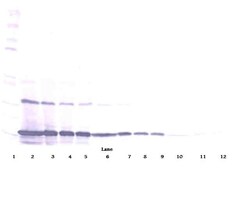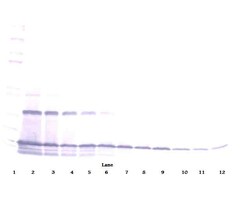Learn More
MCP-1 Polyclonal Antibody, PeproTech®, Invitrogen™
Rabbit Polyclonal Antibody
$250.00 - $2175.00
Specifications
| Antigen | MCP-1 |
|---|---|
| Concentration | 0.1-1.0 mg/mL |
| Applications | ELISA, Western Blot |
| Classification | Polyclonal |
| Conjugate | Unconjugated |
| Catalog Number | Mfr. No. | Quantity | Price | Quantity & Availability | |||||
|---|---|---|---|---|---|---|---|---|---|
| Catalog Number | Mfr. No. | Quantity | Price | Quantity & Availability | |||||
500P7650UG

|
Invitrogen™
500P7650UG |
50 μg |
Each for $250.00
|
|
|||||
500P76100UG

|
Invitrogen™
500P76100UG |
100 μg |
Each for $319.00
|

|
|||||
500-P76-1MG

|
Invitrogen™
500P761MG |
1 mg |
Each for $2,175.00
|
|
|||||
Description
AA Sequence of recombinant protein: QPDAVNAPLT CCYSFTGKMI PMSRLENYKR ITSSRCPKEA VVFVTKLKRE ICADPNKEWV QKYIRKLDQN QVRSETTVFY KIASTLRTSA PLNVNLTHKS EANASTLFST TTSSTSVEVT SMTEN. Preparation: Produced from sera of rabbits immunized with highly pure Recombinant Rat MCP-1 (CCL2). Anti-Rat MCP-1 (CCL2)-specific antibody was purified by affinity chromatography employing an immobilized Rat MCP-1 (CCL2) matrix. Sandwich ELISA: To detect Rat MCP-1 (CCL2) by sandwich ELISA (using 100 μL/well antibody solution) a concentration of 0.5-2.0 μg/mL of this antibody is required. This antigen affinity purified antibody, in conjunction with PeproTech Biotinylated Anti-Rat MCP-1 (CCL2) (500-P76Bt) as a detection antibody, allows the detection of at least 0.2-0.4 ng/well of Recombinant Rat MCP-1 (CCL2). Western Blot: To detect Rat MCP-1(MCAF) by Western Blot analysis this antibody can be used at a concentration of 0.1-0.2 μg/mL. Used in conjunction with compatible secondary reagents the detection limit for Recombinant Rat MCP-1(MCAF) is 1.5-3.0 ng/lane, under either reducing or non-reducing conditions.
This gene is one of several cytokine genes clustered on the q-arm of chromosome 17. Cytokines are a family of secreted proteins involved in immunoregulatory and inflammatory processes. The protein encoded by this gene is structurally related to the CXC subfamily of cytokines. Members of this subfamily are characterized by two cysteines separated by a single amino acid. This cytokine displays chemotactic activity for monocytes and basophils but not for neutrophils or eosinophils. It has been implicated in the pathogenesis of diseases characterized by monocytic infiltrates, like psoriasis, rheumatoid arthritis and atherosclerosis. It binds to chemokine receptors CCR2 and CCR4.Specifications
| MCP-1 | |
| ELISA, Western Blot | |
| Unconjugated | |
| Rabbit | |
| Rat | |
| P14844 | |
| 24770 | |
| E.coli-derived Recombinant Rat MCP-1 (CCL2). | |
| Antigen affinity chromatography | |
| Ccl2 |
| 0.1-1.0 mg/mL | |
| Polyclonal | |
| Lyophilized | |
| RUO | |
| PBS with no preservative | |
| Acidic seminal fluid protein; AI323594; C-C motif chemokine 2; C-C motif chemokine ligand 2; Ccl2; chemokine (C-C motif) ligand 2; GDCF-2; HC11; H-MCP-1; HSMCR30; immediate-early serum-responsive JE protein; immediate-early serum-responsive protein JE; Je; MCAF; Mcp1; MCP-1; MCP1A; MCP-1A; MGC9434; Monocyte chemoattractant protein 1; monocyte chemoattractant protein-1; monocyte chemotactic and activating factor; Monocyte chemotactic protein 1; monocyte chemotactic protein 1A; Monocyte secretory protein JE; monocyte-chemoattractant protein-1 precursor; platelet-derived growth factor-inducible protein JE; RP23-350G1.3; SCYA2; Sigje; small inducible cytokine A2; small inducible cytokine A2 (monocyte chemotactic protein 1, homologous to mouse Sig-je); small inducible cytokine subfamily A (Cys-Cys), member 2; small inducible gene JE; small-inducible cytokine A2; SMC-CF | |
| Ccl2 | |
| Primary | |
| -20°C |
The Fisher Scientific Encompass Program offers items which are not part of our distribution portfolio. These products typically do not have pictures or detailed descriptions. However, we are committed to improving your shopping experience. Please use the form below to provide feedback related to the content on this product.


